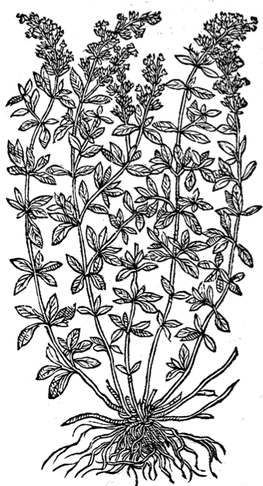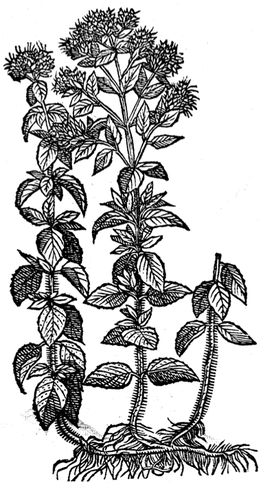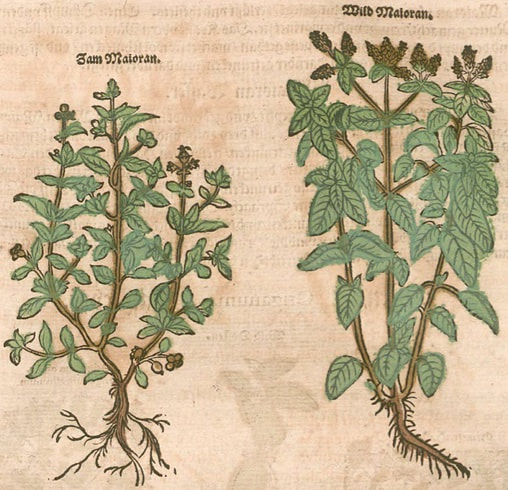Oregano (left) and Marjoram (right)
Dioscorides Materia Medica, Mathias, 1563
Dioscorides Materia Medica, Mathias, 1563
Oregano and Marjoram
Krauterbuch, Lonitzer, 1578
Krauterbuch, Lonitzer, 1578
Left Oregano; Right Marjoram
Icones Plantarum Medcio-oeconomico, Vietz, 1804
Icones Plantarum Medcio-oeconomico, Vietz, 1804
Botanical name:
Oreganum spp.
O. marjorana (Marjoram), O. vulgare (Oregano)
A number of related species are used.
Parts used:
Leaf; Seed
Temperature & Taste:
Warm, dry. Pungent
Classifications:
MARJORAM:
2B ATTENUATERS. 2D ATTENUATERS OF CONGEALED BLOOD. 2H. CARMINATIVE. 2Q. ANODYNE
3G. EMMENAGOGUE. 3M. ARTHRITICS. 3P. MASTICATORIES & STERNUTATORIES.
4a. CEPHALIC. 4b. OPTHALMIC. 4e. STOMACHIC. 4g. HEPATIC. 4j. NERVINE
OREGANO:
2B ATTENUATERS. 2F. PURIFYING. 2G. CLEANSING. 2H. CARMINATIVE. 2K. RESOLVENT
3C. ALEXIPHARMIC. 3F. LITHONTRIPTIC. 3G. EMMENAGOGUE. 3K. EXPECTORANT. 3P. MASTICATORIES & STERNUTATORIES.
4a. CEPHALIC. 4d. PECTORAL. 4e. STOMACHIC. 4f. SPLENETIC. 4g. HEPATIC. 4i. UTERINE. 4k. ARTHRITIC
Oreganum spp.
O. marjorana (Marjoram), O. vulgare (Oregano)
A number of related species are used.
Parts used:
Leaf; Seed
Temperature & Taste:
Warm, dry. Pungent
Classifications:
MARJORAM:
2B ATTENUATERS. 2D ATTENUATERS OF CONGEALED BLOOD. 2H. CARMINATIVE. 2Q. ANODYNE
3G. EMMENAGOGUE. 3M. ARTHRITICS. 3P. MASTICATORIES & STERNUTATORIES.
4a. CEPHALIC. 4b. OPTHALMIC. 4e. STOMACHIC. 4g. HEPATIC. 4j. NERVINE
OREGANO:
2B ATTENUATERS. 2F. PURIFYING. 2G. CLEANSING. 2H. CARMINATIVE. 2K. RESOLVENT
3C. ALEXIPHARMIC. 3F. LITHONTRIPTIC. 3G. EMMENAGOGUE. 3K. EXPECTORANT. 3P. MASTICATORIES & STERNUTATORIES.
4a. CEPHALIC. 4d. PECTORAL. 4e. STOMACHIC. 4f. SPLENETIC. 4g. HEPATIC. 4i. UTERINE. 4k. ARTHRITIC
ADVERTISEMENT:
Uses:
1. Settles Wind, Moves the Blood, Eases Pain:
-’used chiefly in Head-diseases, and diseases of the Nerves ... strengthens the Brain, discusses Wind’. (Marjoram, Schroder)
-Headache, Apoplexy, loss of Speech, Tinnitus, Dizziness, Vertigo
-'excellent against all types of induration and stiffness'. (Galen)
2. Clears Wind-Cold, Resists Poison:
-Colds, Flu, and in Fevers
-chronic Cough, Breathlessness, Difficulty Breathing, Wheezing, and Asthma (Oregano)
-The fresh or dried leaves are ‘drunk in wine for all Mortal Poisons’ (Oregano, Gerard)
3. Moves Blood, Clears Stasis, Promotes Menstruation:
-good for the Uterus; promotes Menstruation: Amenorrhea, Dysmenorrhea (Oregano)
-Infertility
-‘dissolve congealed or clotted blood’ (Marjoram, Gerard)
4. Clears Damp, Promotes Urine:
-Edema; difficulty urinating; scanty or painful urination
-Gravel, Stones, Lower Back Pain
-decoction is best for this purpose
5. Moves Qi, Benefits the Stomach:
-'scarcely a better herb growing for relieving a sour Stomach, Loss of Appetite’.
-Indigestion, Dyspepsia, Colic, Flatulence, Nausea and to prevent Vomiting
6. Moves the Blood, Opens the Liver:
-‘draw forth by stool black and filthy humours’. (Pliny)
-‘bad color which comes of the Jaundice’. (Oregano, Gerard)
7. Externally:
-as an Errhine to purge Phlegm from the Head.
-in pessaries and douches to promote menstruation and clear blood stasis of the Uterus
-topically for Fibroid Tumors of the Breast
-topically for all Pain and Inflammations
-salve was applied to ‘members that are out of Joint ... the Oil ... warms and fastens the Sinews’ (Turner 1551)
-‘putteth away black and blue marks after stripes and bruises, being applied thereto’ (Gerard)
-applied to Sores and Ulcers
-as a plaster with Barley for Eye inflammations
Comment:
Marjoram and Oregano are used similarly. Oregano is generally regarded as stronger, better to promote Menstruation, and better to promote sweat. Marjoram was more commonly used.
Dose:
Decoction: 3–9 grams (dried): 10–30 grams fresh.
Powder: 2–4 grams
Substitutes:
1. Marjoram and Oregano can substitute for one another
2. Mint, Peppermint, Wild Mint
Marjoram and Oregano are used similarly. Oregano is generally regarded as stronger, better to promote Menstruation, and better to promote sweat. Marjoram was more commonly used.
Dose:
Decoction: 3–9 grams (dried): 10–30 grams fresh.
Powder: 2–4 grams
Substitutes:
1. Marjoram and Oregano can substitute for one another
2. Mint, Peppermint, Wild Mint
Main Combinations:
1. Colds, Oregano with ... available in PRO version
2. Catarrh:
i. Oregano ... available in PRO version
ii. Marjoram ... available in PRO version
iii. Marjoram and Oregano ... available in PRO version
3. Promote Menstruation, Oregano with ... available in PRO version
4. Nausea and Dizziness during Menstruation, ... available in PRO version
5. To promote Urine, Marjoram with ... available in PRO version
6. Stomach disorders Marjoram with ... available in PRO version
7. Stomach pain, Marjoram ... available in PRO version
8. Headache and Migraine:
i. Marjoram ... available in PRO version
ii. Marjoram and Oregano ... available in PRO version
9. Vertigo, Marjoram ... available in PRO version
10. Tinnitus, Marjoram with ... available in PRO version
11. Loss of Memory:
i. Marjoram with ... available in PRO version
ii. Marjoram with ... available in PRO version
12. Cold Pains of the Head, Nerves, or Sinews, Marjoram ... available in PRO version
Major Formulas:
Cephalic Decoction (Charras)
Decoction for Stomach Pain
Decoction for Difficult Childbirth (Barbette)
Syrup of Betony (Pharmacopoeia Augustana)
Powder for Catarrh (Grulingus)
Powder to Strengthen the Memory (2)
Powder of Great Use Against Forgetfulness (Grulingus)
ADVERTISEMENT:
Cautions:
Not used during Pregnancy
Main Preparations used:
Marjoram: Distilled Water of the fresh Leaves, Conserve of the Tops, Confection of the Seed, Distilled Oil of the Leaves, Balsam of the Distilled Oi
Oregano: Distilled Water, Distilled Oil, Salt of the Ashes
Not used during Pregnancy
Main Preparations used:
Marjoram: Distilled Water of the fresh Leaves, Conserve of the Tops, Confection of the Seed, Distilled Oil of the Leaves, Balsam of the Distilled Oi
Oregano: Distilled Water, Distilled Oil, Salt of the Ashes






